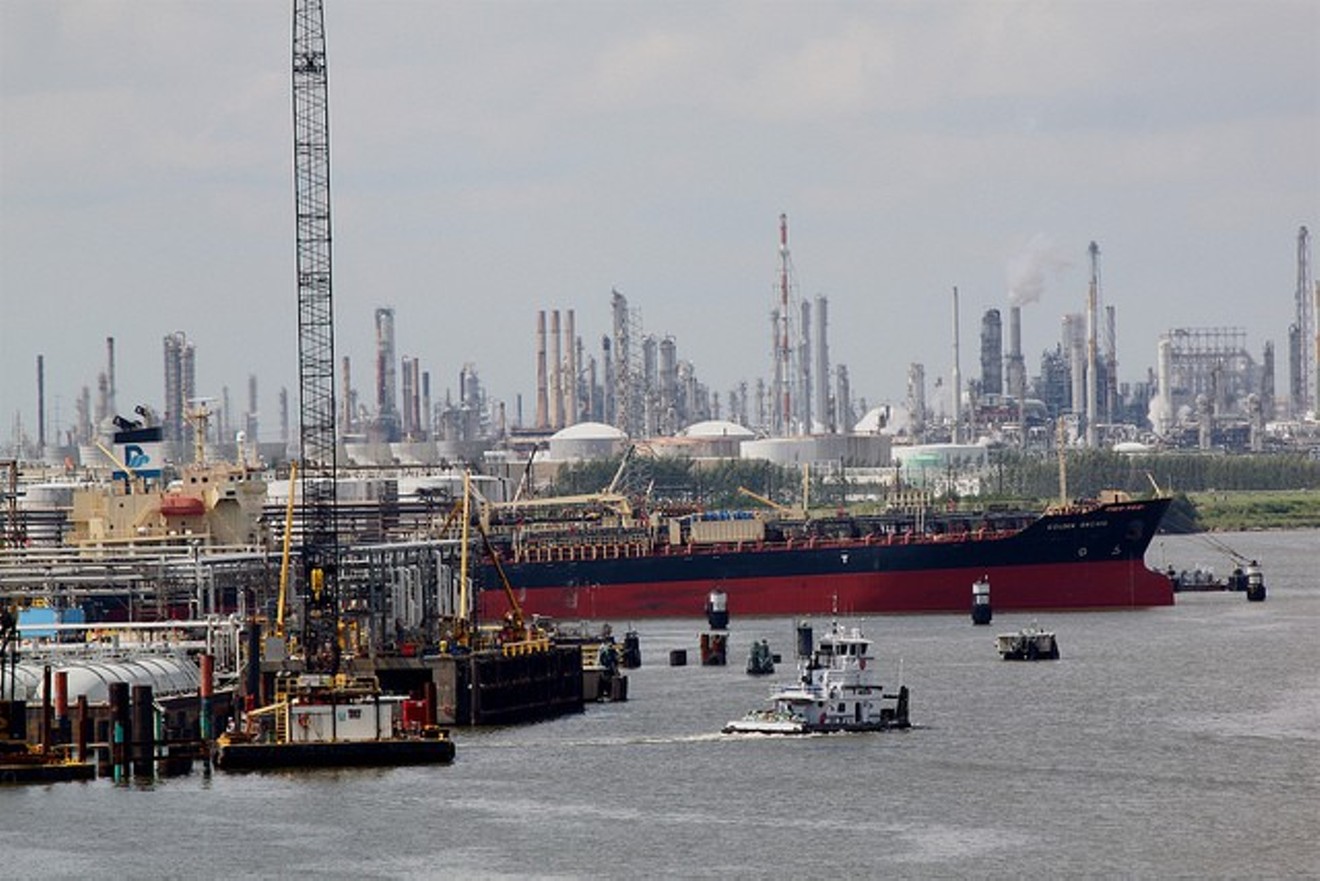As surreal as it may seem, from 2019 to 2021 six Houston-area refineries were pumping 55 million gallons of chemical-laden wastewater directly into the Houston Ship Channel and other public waterways, and most of them weren’t breaking any rules, according to a new report from the Environmental Integrity Project.
The Washington D.C.-based nonprofit regularly examines publicly available federal Environmental Protection Agency data to highlight regulatory issues. For this study, the EIP focused on analyzing EPA data from 2019 to 2021 for 81 of the nation’s 130 refineries currently in operation, all of them selected because they are dumping their wastewater directly into public waterways.
In fact, all comprised the 81 oil refineries included in this EIP analysis were found to be discharging about half a billion gallons of wastewater to rivers, our streams, and estuaries across the United States daily, enough to fill roughly 700 Olympic-sized swimming pools, and doing so with almost no significant regulation from the EPA, Eric Schaeffer, EIP executive director and former director of the EPA’s Civil Enforcement division, said. “Oil refineries are major sources of water pollution that have largely escaped public notice and accountability in the U.S. and too many release a witches’ brew of contaminants to our rivers, lakes and estuaries,” Schaeffer said.
It won’t likely come as a shock that 30 of the refineries on the EIP list are based in Texas while six of them—ExxonMobil Baytown, Pemex Deer Park, Valero Houston, Chevron Pasadena, LyondellBasell-Houston, and Kinder Morgan Galena Park—are right here in and around Houston. And what’s troubling about them isn’t just that they’re churning out wastewater with almost no oversight. It’s also about what’s actually in the water.
These six refineries alone were pumping an average of 55 million gallons of wastewater laced with cyanide, arsenic, chromium, selenium, and other pollutants per day, according to EPA enforcement and compliance data, with that water going directly from the facilities into the Houston Ship Channel and then down into the Gulf of Mexico. And most of the time it’s been just fine with the folks over at the EPA. It's even legal.
So how is that possible? When these guidelines for water discharge were first established by the EPA in 1974 the idea was that the federal agency would be setting the minimum requirements for refinery wastewater, leaving the responsibility for enforcement and putting in more stringent requirements up to each state.
The Texas Commission on Environmental Quality is charged with issuing permits for industrial air and water pollution and with enforcing federal standards, but that’s a tall order for an entity that is notorious for being, let’s say, business friendly. So it shouldn’t be a surprise that TCEQ officials have never shown much interest in closing that regulatory gap and neither has the Texas Legislature. Right now the EPA is conducting an informal investigation about how the state agency regulates water quality after more than a dozen environmental nonprofits submitted a petition claiming the state barely regulates it at all, according to the Texas Tribune.
On top of that, the EPA regulations that actually are in place were based on the existing wastewater treatment plant technology from the 1980s, the last time the requirements were updated, Tom Pelton, codirector of EIP’s Center for Investigations, said. For refineries this means there are only regulations regarding 10 pollutants. The EPA is required to review and revise its wastewater regulations every five years. Although the most recent review was conducted last month, the actual regulations have not actually been revised since 1985, according to the report. The current regulations don’t even have limits on the amount of selenium, cyanide, benzene or mercury that can be discharged.
And yet despite such forgiving federal standards, 67 of the 81 refineries still managed to surpass the limits set on their pollution permits during the three-year period EIP examined. However, only 15 of those found to be in violation faced any consequences in the form of fines. The Phillips 66 refinery in Sweeny, about an hour south of Houston, violated its water pollution permit 44 times from 2019 to 2021 mostly by dumping cyanide into the Brazos River. They were fined just $30,000.
Support Us
Houston's independent source of
local news and culture
account
- Welcome,
Insider - Login
- My Account
- My Newsletters
- Contribute
- Contact Us
- Sign out
Texas Refineries Dump Millions of Gallons of Wastewater, Legally
Dianna Wray February 8, 2023 4:30AM

It isn't just the air that is polluted by industry in Houston and surrounding areas.
Photo by Roy Luck
[
{
"name": "Related Stories / Support Us Combo",
"component": "11591218",
"insertPoint": "4",
"requiredCountToDisplay": "4"
},{
"name": "Air - Billboard - Inline Content",
"component": "11591214",
"insertPoint": "2/3",
"requiredCountToDisplay": "7"
},{
"name": "R1 - Beta - Mobile Only",
"component": "12287027",
"insertPoint": "8",
"requiredCountToDisplay": "8"
},{
"name": "Air - MediumRectangle - Inline Content - Mobile Display Size 2",
"component": "11591215",
"insertPoint": "12",
"requiredCountToDisplay": "12"
},{
"name": "Air - MediumRectangle - Inline Content - Mobile Display Size 2",
"component": "11591215",
"insertPoint": "4th",
"startingPoint": "16",
"requiredCountToDisplay": "12"
}
]
KEEP THE HOUSTON PRESS FREE...
Since we started the Houston Press, it has been defined as the free, independent voice of Houston, and we'd like to keep it that way. With local media under siege, it's more important than ever for us to rally support behind funding our local journalism. You can help by participating in our "I Support" program, allowing us to keep offering readers access to our incisive coverage of local news, food and culture with no paywalls.
Dianna Wray is a nationally award-winning journalist. Born and raised in Houston, she writes about everything from NASA to oil to horse races.
Contact:
Dianna Wray
Trending News
- Former Katy ISD Trustees Band Together To Support Two Trustees Running For Re-Election
- Column: Opting Out of the STAAR Test Requires a Law Degree Or Iron Will
- Four Reasons the Astros Are Bad at Baseball Right Now
-
Sponsored Content From: [%sponsoredBy%]
[%title%]

Don't Miss Out
SIGN UP for the latest
news, free stuff and more!
Become a member to support the independent voice of Houston
and help keep the future of the Houston Press FREE
Use of this website constitutes acceptance of our
terms of use,
our cookies policy, and our
privacy policy
The Houston Press may earn a portion of sales from products & services purchased through links on our site from our
affiliate partners.
©2024
Houston Press, LP. All rights reserved.





